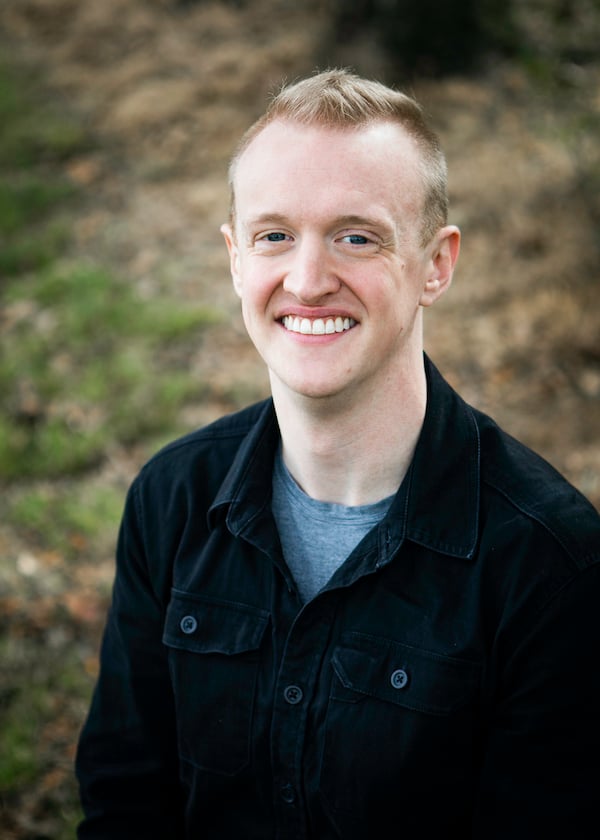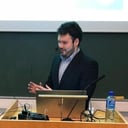You can learn more about Peyton and his experiences on his personal portfolio page, his GitHub and his LinkedIn.
Hey Peyton, thanks for doing this with us! Let’s start at the beginning, what’s your background? Who are you? What’s your history?
Glad to be here! My journey started in business. I was a logistics analyst for a little over four years, working as a contractor for the Department of Defense. Most of my time was spent in project management, ensuring that my projects remained within the budget and the initial schedule as much was possible.
My logistics career reached its height when I deployed to Afghanistan. I was attached to a contract that provided logistical and maintenance support to an aviation unit that handled combat and drug-interdiction operations. I am so grateful for my time in-theatre. It gave me the opportunity to work alongside over twenty nationalities and some of the greatest people I’ve ever known. However, due to unfortunate events that occurred at the end of my deployment and a realization that I was not going to be happy longterm in my current career, I knew I had to make a change.
After returning home, I started a drop shipping business and cut my teeth in the e-commerce space. While the decision didn’t work out in the end, I learned a great deal from the experience, and it was the beginning of my journey into the world of software.
“Algorithms were just so difficult to understand, and it was even more difficult finding someone who explained the concepts well”
How did you first find an interest in Tech and Programming?
My interest in software began with my drop shipping business. There were a number of duties I had with the business, including obtaining supplier accounts, forward / reverse logistics (i.e. shipping / returns), customer relations, and social media marketing. But, I found the activity I enjoyed the most was building the front end store front. I would spend hours pouring over the color palette, theme design and layout, button placements, and background images. I was fascinated by the process, and I loved trying to anticipate what my users would want to see and how to create the best user experience.
I began attempting to adjust the DOM structure, style sheets and JavaScript in my themes. This led me to obtaining my first web development contract for an orthopedic surgery firm, and it snow-balled from there. I had found my passion, and I wanted to learn more about software development. So, I enrolled in Udacity’s Full Stack Nanodegree program.
What are you looking to learn?
I’ve been almost entirely focused on data structures and algorithms for roughly the past year and have been studying that with my mentor Annie. Algorithmic thinking has drastically improved my coding abilities on a day-to-day basis. More importantly, algorithmic thinking has contributed to my attention-to-detail and problem solving capabilities which I’ve used to solve some tough bugs during debugging. Now, I can actually hold my own solving some medium level algorithms. On LeetCode, I’ve actually come up with the optimized solutions on a number of occasions on the first pass. I still need to be more efficient with higher-level problems, but that’s just a practice-makes-perfect issue.
A big topic I’m starting to move my attention towards is systems design. My other mentor, Trace, was able to recommend an excellent course for me, and I’m spending about 45 minutes to an hour a day working through the examples they have.
I tried teaching myself algorithms, but they were just so difficult to understand, and it was even more difficult finding someone who explained the concepts well (SPOILER-ALERT: most people don’t). I’m an auditory learner, so for me to get a concept, I have to talk about it with someone. Getting a mentor was the best decision I’ve ever made on this journey.
Did you start with a mentor right away? What resources did you use to get started?
I started with my first mentor Annie about a week after I applied. I started working with her as soon as she approved my application. We just got started with a simple phone call that lasted about half-an-hour. During that call Annie got to know a bit about me, my background, coding experience, learning objectives, etc.. From there, we scheduled our chat in the last week of December where we came up with a plan of action about how to achieve my goals, and we’ve been grinding it out ever since!
How did you come across MentorCruise?
I found MentorCruise just by googling the term “software mentor.” It was in the 3rd or 4th result at the time, but it was the only option that provided a consistent weekly option to meet with a mentor
“Annie was a game-changer for me”
You first chose Annie to be your mentor. How did you look and find a mentor that’s suitable for you?
The main metric I used was algorithms. I needed someone who understood algorithms well-enough to teach me. After that, I wanted someone who was proficient in JavaScript. Annie was the best of both worlds. On top of that, her professional experiences were similar to mine when she came to software engineering, so I really wanted her because I felt she would understand me on a fundamental level.

What did you expect when you first signed up? Did you have to change your expectations?
I had hopes that the learning process would be quicker, but that wasn’t the case. I didn’t expect everything to happen overnight or in just a few meetings. I was addressing short-comings from my bootcamp, and while I wanted to be done quickly, that’s not how learning works. I knew that it would happen if I remained committed to the goal, and that’s what I’ve done. It was a difficult process, and very frustrating at times, but I stuck with it. And slowly, but surely, I made progress. I went from being a fish out of water with algorithms, to coming up with a good approach in pseudo code. Then I started solving some of them. The keys that helped me succeed were persistence and a long-term mindset.
What were your goals for the mentorship? What were the short-term and what were the long-term goals?
My initial goal for the mentorship was to learn algorithms. Given that Annie is such an amazing developer, I’ve also learned better coding practices from her. Short-term: Gain competence to be able to hold my own whilst solving algorithms on a white-board.
Long-term: Become proficient in solving algorithms and then start taking on more and more challenging computer science concepts after that.
Is your mentor helping you getting there? How would the situation change without your mentor?
Absolutely! Annie was the game-changer for me. When I started, I was like a fish out of water. I had no idea how to even go about solving an algorithm. I suffered terribly from imposter syndrome. However, through Annie’s consistent mentorship, she put me in uncomfortable situations like I would face in a whiteboard interview. She wouldn’t just give me the answer when I was struggling. She gave me the tools, and she stepped in only when I had exhausted all other options. It was during these struggles that I started to really grow as a developer.
The situation would be far more difficult without Annie in the picture. She knows these topics backwards and forwards, AND she knows how to communicate these same topics in a way I can understand. It’s very difficult and inefficient to try and reinvent the wheel all by yourself.
You later started working with more and multiple mentors. What was the decision behind that?
There’s an idea I brought with me from my former life in Afghanistan that I learned from special operations forces: cross-training. Cross-training is a knowledge-sharing concept special ops soldiers use to shore up their deficiencies by meeting with other special operations units and sharing their knowledge with each other about different things. In doing this, they learn new skill sets and acquire new tools and knowledge to help them succeed and complete their mission. I decided I should apply this to mentoring.
I had Annie for data structures, algorithms and job hunting strategies. I got another mentor who focused on practical coding exercises, helping me with bugs I ran into building my projects. I think this has worked quite well because it allowed each mentor to focus on one particular set of skills to impart. This helped them stay focused, and it allowed me to absorb more information than if they had to break up their routine to talk about something different. Also, I’ve just found some people are more gifted at teaching different things, this approach makes allowance for that. It may not work for everyone, but it’s how I’ve preferred to pursue my mentorship.
How are you typically communicating with your mentors?
I’ve communicated with my mentors via call, text, email, Slack and Zoom. Annie and I communicated almost entirely by phone (calls and texts) for several months, until we switched to texting and Zoom meetings. I set up a Slack channel for my mentor and I to share articles, etc with one another. There are loads of easy and effective ways to stay in communication with your mentor. My recommendation is to have some sort of chat medium to post questions / discussions, as well as coordinating video / audio chats.
“Interviewers were pleased with my thought processes and clear communication style”
Are you missing anything in your mentorship experience, which could become better in the future?
Honestly, in my opinion, no. A mentor outlines their expertise. They are extremely competent and very helpful. However, sometimes you come across a problem they haven’t seen yet, and sometimes their experience can’t solve it right away. A lot of people might be upset by this, but I interpret that to mean that you’re skills as an engineer are expanding - and rapidly. That’s a sign to me the mentorship is working. So long as the mentor / mentee is consistent in communication, reliable for meets - or rescheduling if there is a conflict, the relationship works great! Again, communication and long-term focus are the keys.
How does the future look for you? What are the next steps?
I’d say my future looks very bright! I recently had an interview with a well-known sports apparel company. While I didn’t get the job, I received excellent feedback from my interviewers. They were very pleased with my logical thought process and clear communication style, which I have developed because of my mentorship with Annie and Trace. Even though it was not an algorithmic technical screen, I still used pseudocode to outline how I was going to solve the practical exercise. This helped me to stay calm and on point in solving the problem, and I was successful! Unfortunately, I didn’t solve the problem the way they were looking for, but after reviewing their feedback, it won’t be difficult to make sure that’s addressed for next time.
My next step is to continue searching for and obtain a full-time remote front-end or full stack engineering position. I’d like the opportunity to see the world again, whilst taking my work with me. New tools I’m interested in learning are progressive web apps, TDD and design patterns. Continuing to master the fundamentals of data structures and algorithms goes without saying.
Is MentorCruise part of that?
Most-definitely, absolutely, YES. I wouldn’t have gotten this far without MentorCruise. If I’ve learned anything from my journey into software engineering it is you have to be tenacious and always ready to learn something new. And, I think there is no better way to learn than working with someone to help show you the way.







